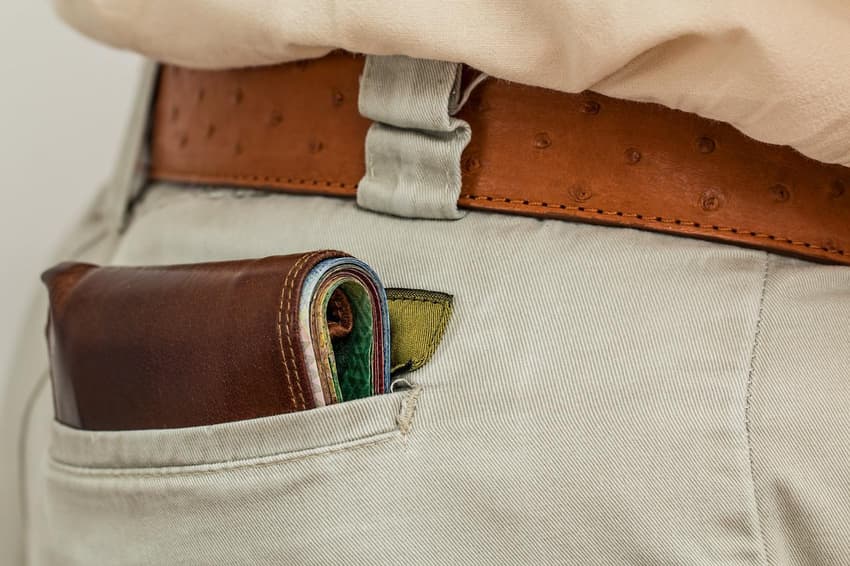Seven tourist scams to be aware of in Switzerland

Are you coming to Switzerland this spring or summer? Great — you will enjoy visiting this beautiful country, but be careful not to fall victim to fraudulent schemes while you are here.
Don’t worry: Switzerland is a safe country — certainly safer than many others — and serious crime is rare.
The vast majority of people you will encounter in Switzerland are honest, so don’t think there is a scammer waiting to pounce on you on every street corner.
However, it always a good advice for a visitor to any foreign country to stay alert, be cautious, and not fall prey to tricksters out to get your money.
These scams are not typically ‘Swiss’ per se - if someone comes at your with a Swiss army knife while yodelling, we'd love to hear about it - as they can happen anywhere in the world.
They are not ‘common’ in a sense that they are widespread; rather, this means they are the ones that you are most likely to encounter while visiting Switzerland.
Here are some scams to be aware of. One thing to remember is that these scams are very much targeted at tourists, which means you are likely to encounter them in locations popular with tourists, whether these are real or virtual.
Scams which you might see elsewhere - such as dodgy taxi meters, fake tourist prices at restaurants or fake tour guides - are not common in Switzerland, but are still worth looking out for.
If you're visiting a popular tourist site or trying to scout accommodation online, best to be on your toes. If you see something fishy, call the police on 117.
Have we missed one? Get in touch at [email protected].
Rental scam
If you opt to rent a flat or holiday apartment rather than stay in a hotel, keep in mind that not all advertisements you see online are legitimate.
As Swiss news outlet Blick reported, “Scammers try to extract thousands of francs from people looking for accommodation”.
These false ads invariably feature photos of beautiful properties for prices that are totally incompatible with reality — for instance, a fully furnished large studio in the centre of Geneva (the most expensive rental market in Switzerland) for merely 450 francs a month.
How do you know such offers are scams? Usually if it seems too good to be true, then it is.
But there are a few other telltale signs.
One example is if the landlord tells you he will send the key by mail — after you pay one month’s rent in advance.
Another is to ask for specific personal details, like a copy of your passport, before you visit the apartment.
READ MORE: How to avoid rental scams in Switzerland
In order to avoid this, try and book through reputable sites - although this is no guarantee, as scammers can find there way to AirBnb and other well-known accommodation companies.
One way to see whether the property advertised online is legitimate is to pay attention to details in the photos.
One indicator that should sound the alarm is the shape of electrical outlets. In the aforementioned Geneva studio, for example, the outlets “are clearly Italian”.

A Swiss power outlet. By ZH8000, Filzstift - CC BY-SA 4.0.
As the old wisdom has it: if it is too good to be true, run the other way.
'Deaf' people asking for money
If you sit in an outdoor café and a person carrying a little sign approaches you asking for money, beware.
The sign says (often in several languages) that the person is deaf and asks for a donation for the organisation helping people with hearing impairments.
You can be sure this is a scam. How? The Swiss Federation for the Deaf says it never asks, or authorises anyone, to collect donations in this way.
Generally, most charities and advocacy groups do not collect cash then and there. Instead, they'll want you to make a regular contribution, so be wary.
Fake ticket checkers or police
If you're in a different country, it can be a relief to be approached by a person in an official capacity, whether that be a police officer or someone checking a ticket.
As many Swiss train stations do not have barriers, your ticket will be checked by an official ticket checker roaming the train.
Often, they'll ask to see your ID or ticket, swiping something from your wallet in the process. Always ask to see official ID and never hand over anything without being sure.
The ‘bonneteau’ game scam
This particular scam used to be widespread in Geneva but is now outlawed.
However, you could still come across it somewhere in the dark corners of Swiss cities, as scammers will hide away from authorities.
A person will invite you to play a game where a small ball is moved under three cups; you must place a bet (starting at 100 francs!) and guess under which cup the ball is hidden.
This is akin to throwing your money out the window because you will never win — but lose plenty if you are drawn into this scam.

If the person 'winning' looks like the brother of the dealer, you're probably witnessing a scam.
Begging
In comparison to many other countries, beggars are still relatively rare in Switzerland. However, you may see them in tourist areas of large cities, sometimes accompanied by children or pets.
While some of these people may legitimately need money, the many are reportedly part of organised networks.
According to Geneva police, where beggars reportedly cross the border from France each day to ‘work’, ”clan organisation directs these networks, with a chief at its head who sends the members of the clan to beg and reaps the fruit of their begging.”
Whether you choose to donate is of course up to you, but if you really want to help then consider donating to charitable groups such as Swiss Solidarity.
‘Free stuff’ scam
Say you are walking down a street and someone approaches you and offers you a something for free. It could be a flower, a ‘friendship bracelet’, or anything else. The moment you take it, the person demands money and causes a scandal if you refuse to pay.
These people could be disguised as Buddhist monks or other trustworthy figures, but don’t accept anything from anybody you don’t know.
If this does happen to you and the person threatens you when you refuse to pay, just walk away. The law is on your side, not theirs.

Never accept 'freebies' from anyone. Photo: Photo by Zoe Schaeffer on Unsplash
Pickpockets
These people ply their trade in crowded tourist spots, so be careful about how you carry your belongings.
They are much more sophisticated than pickpockets of yore who merely slid their hand in a back pocket of your pants and took your wallet.
These days, they are more likely to operate in gangs or at least teams of two — one person will distract you (by bumping into you, for example, or by telling you that you have something like bird poo on your shirt) while the other will cut the strap of your bag and run away or simply take your phone or wallet.
Another scam involves pressing up close to you and 'dancing' with you, while removing valuables from your bag or pocket.
Perhaps the most common trick combines the fake charity scams listed above with pickpocketing. It is particularly effective for people sitting at cafes or bars who have their phone or wallet sitting on the table.
Scammers will carry a clipboard or pretend to sell/donate magazines.
They'll walk over to where you are sitting and hold the clipboard over it, asking you to donate or sign a petition. This will obscure your view of your valuables, which they will pocket.
To avoid these scams, act like a local. Walk briskly through crowded places and carry only the basic necessities with you, leaving valuables in your hotel room. And never put your phone, wallet or other valuables on a bar or table.
Other than all of the above, enjoy your Swiss holiday!
Comments
See Also
Don’t worry: Switzerland is a safe country — certainly safer than many others — and serious crime is rare.
The vast majority of people you will encounter in Switzerland are honest, so don’t think there is a scammer waiting to pounce on you on every street corner.
However, it always a good advice for a visitor to any foreign country to stay alert, be cautious, and not fall prey to tricksters out to get your money.
These scams are not typically ‘Swiss’ per se - if someone comes at your with a Swiss army knife while yodelling, we'd love to hear about it - as they can happen anywhere in the world.
They are not ‘common’ in a sense that they are widespread; rather, this means they are the ones that you are most likely to encounter while visiting Switzerland.
Here are some scams to be aware of. One thing to remember is that these scams are very much targeted at tourists, which means you are likely to encounter them in locations popular with tourists, whether these are real or virtual.
Scams which you might see elsewhere - such as dodgy taxi meters, fake tourist prices at restaurants or fake tour guides - are not common in Switzerland, but are still worth looking out for.
If you're visiting a popular tourist site or trying to scout accommodation online, best to be on your toes. If you see something fishy, call the police on 117.
Have we missed one? Get in touch at [email protected].
Rental scam
If you opt to rent a flat or holiday apartment rather than stay in a hotel, keep in mind that not all advertisements you see online are legitimate.
As Swiss news outlet Blick reported, “Scammers try to extract thousands of francs from people looking for accommodation”.
These false ads invariably feature photos of beautiful properties for prices that are totally incompatible with reality — for instance, a fully furnished large studio in the centre of Geneva (the most expensive rental market in Switzerland) for merely 450 francs a month.
How do you know such offers are scams? Usually if it seems too good to be true, then it is.
But there are a few other telltale signs.
One example is if the landlord tells you he will send the key by mail — after you pay one month’s rent in advance.
Another is to ask for specific personal details, like a copy of your passport, before you visit the apartment.
READ MORE: How to avoid rental scams in Switzerland
In order to avoid this, try and book through reputable sites - although this is no guarantee, as scammers can find there way to AirBnb and other well-known accommodation companies.
One way to see whether the property advertised online is legitimate is to pay attention to details in the photos.
One indicator that should sound the alarm is the shape of electrical outlets. In the aforementioned Geneva studio, for example, the outlets “are clearly Italian”.

As the old wisdom has it: if it is too good to be true, run the other way.
'Deaf' people asking for money
If you sit in an outdoor café and a person carrying a little sign approaches you asking for money, beware.
The sign says (often in several languages) that the person is deaf and asks for a donation for the organisation helping people with hearing impairments.
You can be sure this is a scam. How? The Swiss Federation for the Deaf says it never asks, or authorises anyone, to collect donations in this way.
Generally, most charities and advocacy groups do not collect cash then and there. Instead, they'll want you to make a regular contribution, so be wary.
Fake ticket checkers or police
If you're in a different country, it can be a relief to be approached by a person in an official capacity, whether that be a police officer or someone checking a ticket.
As many Swiss train stations do not have barriers, your ticket will be checked by an official ticket checker roaming the train.
Often, they'll ask to see your ID or ticket, swiping something from your wallet in the process. Always ask to see official ID and never hand over anything without being sure.
The ‘bonneteau’ game scam
This particular scam used to be widespread in Geneva but is now outlawed.
However, you could still come across it somewhere in the dark corners of Swiss cities, as scammers will hide away from authorities.
A person will invite you to play a game where a small ball is moved under three cups; you must place a bet (starting at 100 francs!) and guess under which cup the ball is hidden.
This is akin to throwing your money out the window because you will never win — but lose plenty if you are drawn into this scam.

If the person 'winning' looks like the brother of the dealer, you're probably witnessing a scam.
Begging
In comparison to many other countries, beggars are still relatively rare in Switzerland. However, you may see them in tourist areas of large cities, sometimes accompanied by children or pets.
While some of these people may legitimately need money, the many are reportedly part of organised networks.
According to Geneva police, where beggars reportedly cross the border from France each day to ‘work’, ”clan organisation directs these networks, with a chief at its head who sends the members of the clan to beg and reaps the fruit of their begging.”
Whether you choose to donate is of course up to you, but if you really want to help then consider donating to charitable groups such as Swiss Solidarity.
‘Free stuff’ scam
Say you are walking down a street and someone approaches you and offers you a something for free. It could be a flower, a ‘friendship bracelet’, or anything else. The moment you take it, the person demands money and causes a scandal if you refuse to pay.
These people could be disguised as Buddhist monks or other trustworthy figures, but don’t accept anything from anybody you don’t know.
If this does happen to you and the person threatens you when you refuse to pay, just walk away. The law is on your side, not theirs.

Never accept 'freebies' from anyone. Photo: Photo by Zoe Schaeffer on Unsplash
Pickpockets
These people ply their trade in crowded tourist spots, so be careful about how you carry your belongings.
They are much more sophisticated than pickpockets of yore who merely slid their hand in a back pocket of your pants and took your wallet.
These days, they are more likely to operate in gangs or at least teams of two — one person will distract you (by bumping into you, for example, or by telling you that you have something like bird poo on your shirt) while the other will cut the strap of your bag and run away or simply take your phone or wallet.
Another scam involves pressing up close to you and 'dancing' with you, while removing valuables from your bag or pocket.
Perhaps the most common trick combines the fake charity scams listed above with pickpocketing. It is particularly effective for people sitting at cafes or bars who have their phone or wallet sitting on the table.
Scammers will carry a clipboard or pretend to sell/donate magazines.
They'll walk over to where you are sitting and hold the clipboard over it, asking you to donate or sign a petition. This will obscure your view of your valuables, which they will pocket.
To avoid these scams, act like a local. Walk briskly through crowded places and carry only the basic necessities with you, leaving valuables in your hotel room. And never put your phone, wallet or other valuables on a bar or table.
Other than all of the above, enjoy your Swiss holiday!
Join the conversation in our comments section below. Share your own views and experience and if you have a question or suggestion for our journalists then email us at [email protected].
Please keep comments civil, constructive and on topic – and make sure to read our terms of use before getting involved.
Please log in here to leave a comment.